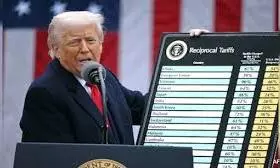US Retaliatory Tariff: India hopeful of more tariff cuts
Govt steps up efforts to narrow its bilateral trade surplus;

New Delhi: With the imposition of 27 per cent reciprocal tariffs on India, announced by the United States President Donald Trump, the government on Thursday has said that it is carefully examining the implications of the tariffs on India. Top government officials, however, are hopeful that some more tariff cuts would be likely soon as the government is making efforts to narrow its bilateral trade surplus. It further said that the department in commerce ministry is engaged with all stakeholders, including domestic industry and exporters to seek their feedback on the issue.
The move of Trump revealing such a package of new tariffs on several countries, including India, is expected to bolster US manufacturing, but industry experts and government sources assured that the reciprocal tariff on India could be a mixed reaction, but not a setback at all. Trump has announced sweeping tariffs on over 50 odd countries, including India as per which a universal 10 per cent baseline tariff would apply to all imports from April 5 and country-specific reciprocal tariffs replace the baseline tariffs from April 9.
However, India is closely examining the implications of the reciprocal tariffs, while reaffirming its commitment to ongoing trade negotiations with Washington under the joint ‘Mission 500’ initiative, aiming to more than double the bilateral trade to US $500 billion by 2030. “The US reciprocal tariffs are a mixed reaction for India and not a setback. I think the commerce ministry is analysing and will take care of the impact on the tariffs to grow trade and investments for both the economies,” said a commerce ministry official.
“Also there is a rule that if a country would address the concerns of the US, the Trump administration can consider reducing the duties against that nation. We are in touch with the Trump administration on these issues and expect to take them forward in the coming days. The government is hopeful that more tariff cuts would be in the offing as India has expressed its willingness to buy more American oil, LNG and defense equipment to narrow its bilateral trade surplus,” the official added.
As per a statement issued by the commerce ministry, Trump has announced the imposition of additional ad-valorem duties ranging from 10 per cent to 50 per cent on imports from all trading partners. “The baseline duty of 10 per cent will be effective from April 5 and the 27 per cent from April 9. Certain sectors are exempted from these duties include pharma, semiconductors and energy products. The department of commerce is carefully examining the implications of the various measures/ announcements made by the President of the USA,” it said.
It further said that discussions are ongoing between Indian and US trade teams for the expeditious conclusion of a mutually beneficial, multi-sectoral bilateral trade agreement (BTA). “The BTA will cover a wide range of issues of mutual interest including deepening supply chain integration. The ongoing talks are focused on enabling both nations to grow trade, investments and technology transfers,” the statement added.
Meanwhile, the Prime Minister’s Office (PMO) is learnt to have called for a high-level meeting to assess the reciprocal tariff announcements made by Trump. The meeting, chaired by the principal secretary to the Prime Minister, PK Mishra, will assess the situation and senior officials from the commerce ministry, Niti Aayog, and others have reportedly briefed the PMO. The meeting comes as Prime Minister Narendra Modi reaches Thailand for a two-day visit to attend the sixth BIMSTEC summit.
Commenting on the move of Trump’s tariff decision on India, Assocham president Sanjay Nayar said “net-net”, it appears India’s export competitiveness to the US market stands far less impacted on a relative basis. “Yet our industry should make concerted efforts to increase export efficiency and value addition, to mitigate impact of these tariffs. said Nayar said, adding that since most of American trading partners have planned to levy reciprocal tariffs, no country gets a winning advantage while consumers may end up paying more leading to inflationary pressures.

